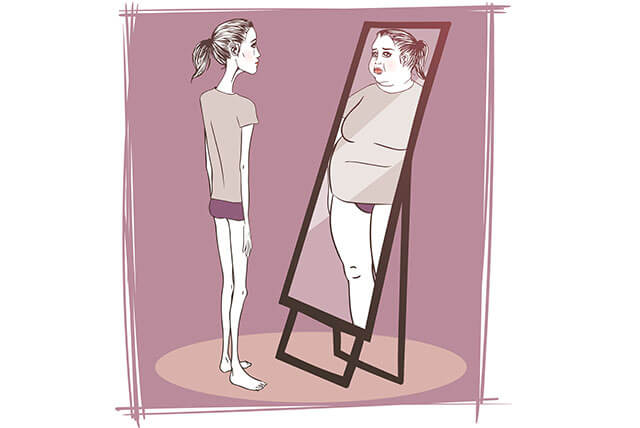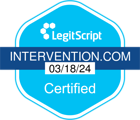The standard of beauty in the U.S. is pretty hard to meet these days. Men, women, kids… all of us diet out of fear of getting fat. There is so much pressure to be thin that we’re seeing millions of people, of all kinds, developing eating disorders in the U.S. alone.
Two of the main eating disorders you need to know about are Bulimia and Anorexia. These two conditions are similiar and sometimes occur together, but there are key differences between them. We’ll go into detail here about both conditions, so you will be more able to distinguish the two. Hopefully this knowledge will help you or a loved one to obtain the treatment needed to break free from bulimia or anorexia.
First things first, let’s discuss a third condition called Body Dysmorphic Disorder. I’m bringing this up first because it is often the underlying anxiety disorder that leads to the disordered eating we see in bulimia and anorexia.
Body Dysmorphic Disorder
This condition is categorized by psychologists as an anxiety disorder. When someone has body dysmporphic disorder, BDD, it means they have become preoccupied, and distressed by a real or imagined bodily flaw. Those affected believe that the flaw makes them hideous and worthless, damaging self-esteem. It’s normal to have some insecurities or concerns about flaws, but with BDD, body-image insecurities get in the way of your life. Those suffering BDD might spend hours in front of the mirror, worrying, insulting oneself, crying, and wishing they were different. The flaw could be anything, but often times the focus of BDD is body fat.
Not everyone with BDD develops an eating disorder. However, most people suffering from anorexia and bulimia experience BDD centered around their body fat.

Common Risk Factors for BDD and Disordered Eating
- Researchers have found the genetics accounts for 30%-80% of the risk for developing anorexia or bulimia. Scientists are working now to identify specific genes that may cause these eating disorders.
- Social pressure to be thing contributes to the prevalance of anorexia and bulimia. Since the 1950s, when televised images of skinny beautiful people popped up everywhere, rates of disordered eating have been skyrocketing. Social scientists have tracked the relationship between western media and eating disorders all over the world for years now. Today, there are campaigns to establish more realistic standards of beauty in the media. However, in general, the media still puts immense pressure on us to be thin and perfect.
- Being a girl: women and girls are ten times more likely to develop anorexia or bulimia than males. Many experts believe this is because women are under an even greater pressure to be thin. A growing number of boys and men have been developing eating disorders. In males, eating disorders are more often accompanied with over-exercising because they tend to desire a muscular look rather than a skinny look.
- Having a mood disorder: Mood disorders and eating disorders are related. Many people suffering from anorexia or bulimia have some form of depression or anxiety as well. Experts speculate that losing weight with anorexic and bulimic behaviors restores a sense of control and self-esteem. In other words, losing weight is used to soothe underlying mood disorders in some anorexic and bulimic patients.
- Trauma
- Being close to other people with disordered eating. Growing up in a home where one or both parents were always on a diet can contribute to disordered eating in children.
Anorexia Nervosa
Individuals experiencing anorexia are characterized by low body weight, intense fear of becoming fat, drastic food restriction, and a desire to be thin. Oftentimes those suffering from anorexia view themselves as overweight, which is disturbing to friends and family who clearly see otherwise.
The main behavior associated with anorexia is food restriction. This behavior leads to the following physical and emotional symptoms:
- Amenorrhea, loss of the menstrual cycle
- Lanugo, which are soft fine hairs that grow all over the body
Obsession with calorie counts and fat contents of foods | Food rituals such as hiding food or eating in secret | Using laxatives and diet pills | Cold intolerance | Excessive exercising | Low blood pressure | Rapid or irregular heartbeat | Rounded belly | Social Isolation | Bad breath | Dry, brittle skin and hair | Hair loss | Chronic Fatigue | Mood swings | Orange discoloration of feet | Muscle aches and pains | Malnourishment | Death
Bulimia Nervosa
As with anorexia, bulimia is characterized by fears of becoming fat, food restriction, and a strong desire to be thin. However, what makes bulimia unique is binging and purging behavior. Additionally, bulimia has a stronger link with depression than anorexia.Those with bulimia may not be so shockingly thin as anorexia patients, but they are still often underweight.
What makes bulimia and unique is the presence of binging and purging behaviors. Binging refers to an episode where someone eats an unnecessarily large amount of food in less than 2 hours. Binging usually leads to feelings of shame and guilt which then lead to a desire to “reverse the damage” by purging. The purging behavior we see most frequently is forcing oneself to throw up with hands, objects, or certain medicines.
Purging behaviors damage the body over time. In addition to the risks from calorie restriction and malnourishment that we see in anorexia, we also see additional symptoms that result from purging. Here are the unique physical and emotional symptoms of bulimia:
- Chronic gastric reflux
- Dehydration and electrolyte imbalances
- Irregular heart rhythm
- Inflammation of the esophagus
- Rupture, and bleeding of the esophagus wall
- Bleeding from the stomach/esophagus junction
- Mouth injuries
- Hand scarring and infection, from repetitive contact with the teeth
- Erosion and loss of teeth
- Constipation
- Ulcers
- Low self-esteem
- Low blood pressure
- Disrupted menstruation
- Dry skin
- Hair loss
- Chronic fatigue
Now is time to take action
If after learning more about these 2 common and life threatening eating disorders, you feel that you or someone you love is suffering from anorexia or bulimia, please reach out.
At Breathe Life Healing Centers, we have expert staff trained to help you move past the damage in your life caused by anorexia or bulimia. Founder Brad Lamm has personally experienced the struggle with eating disorders, and strives to help others break free too.

